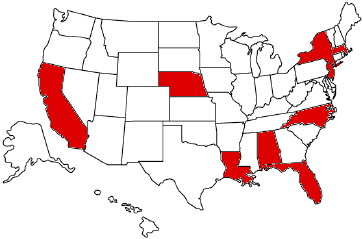Our mid-year update to the Enforcment Action Database shows absolutely no change in the FCC’s enforcement protocol regarding unlicensed broadcasting. Although the agency is running ahead of its enforcement action pace last year (70 to date, compared to 125 for all of 2015), it’s well off the highs seen late last decade. Fewer than three dozen unlicensed radio stations in just six states have had some form of contact with the FCC in 2016.
 So far, Florida is the hottest spot for FCC activity with 25 actions to date; New Jersey and New York respectively round out the top three. That’s a surprising drop for the Empire State, which has not only topped the list for the last four years but whose Congressfolk and licensed broadcast constituency (along with their colleagues in New Jersey) have been clamoring for more anti-pirate policing.
So far, Florida is the hottest spot for FCC activity with 25 actions to date; New Jersey and New York respectively round out the top three. That’s a surprising drop for the Empire State, which has not only topped the list for the last four years but whose Congressfolk and licensed broadcast constituency (along with their colleagues in New Jersey) have been clamoring for more anti-pirate policing.
Some of this political pressure may have been a factor in three monetary forfeitures issued to New Jersey pirates last month. Industry trades made great hay out of the $40,000 in total penalties — but all of these stem from cases that originated last year. That said, the FCC handed out just a single forfeiture in 2015, but perennial collection difficulties remain. Continue reading “Paper Tiger Teams MIA…So Far”
Month: June 2016
Removing the Public From Public Files
The FCC is currently considering a proposed rulemaking to radically change the content of the public files maintained by broadcast stations. Within the last few years, the agency has deliberated and approved changes in the way public files must be kept: everything’s moving online now, which will ostensibly make both maintaining and browsing public files easier on broadcasters and the viewing/listening public.
The migration of public files online is happening gradually; television stations went first and now radio stations are following on. Radio stations in the top 50 markets must make their public files available online by no later than June 24th. Public files contain a plethora of information about any given station; for commercial broadcasters, this includes station engineering specifications, hiring practices, political/public-interest programming, and correspondence with the public directly. Continue reading “Removing the Public From Public Files”
HD Radio: "We're Still Here"
After its lackluster appearance at the NAB Show earlier this year, HD Radio‘s new owners, DTS Inc., are trying mightily to demonstrate that the technology remains a viable future for broadcast radio. In May, DTS announced its first-quarter financials, representing the first full quarter of its ownership of iBiquity. As expected, the acquisition had a positive effect on DTS’ bottom line, no doubt from the revenue stream involving licensing HD receivers in cars (for which the company gets paid as much as $12 per unit).
Presently, however, HD Radio is found in just 37% of all new vehicles sold in the United States — a far cry from widespread penetration, but more than enough to move the needle in DTS’ ledgers. According to a company conference call earlier this year, the acquisition of HD Radio is part of a pivot by DTS away from developing/acquiring audio enhancement systems for home entertainment technologies (which are on the decline) and toward the mobile and portable device spaces (which are growing mightily). By the end of 2016, DTS expects its automotive division (which includes HD Radio) to account for some 40% of all revenues. Continue reading “HD Radio: "We're Still Here"”